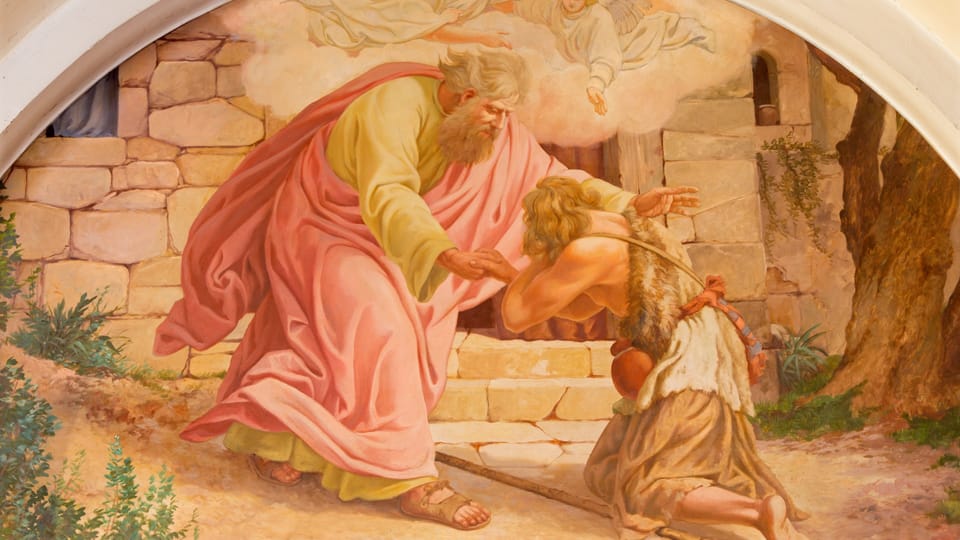Outreach: Invest and Invite (Luke 15)

Big Idea: Churches can be barriers to faith instead of being welcoming, unlike Jesus, who embraced everyone, especially those outside religious circles.
A few years ago, we attended a very large church in Florida. When you attend a church for a while, you become accustomed to the way that things are done. I've been going to church my whole life, so I know when to sit, stand, and what's happening during the service. I don’t even think about it; I’m familiar with the protocol. But this church was different. When it was time to sing, nobody announced a song. Everybody just stood up, pulled out a hymnbook, and started singing. It wasn’t until midway through the service that I figured out what was going on. The service was being broadcast, so we had to keep up without interrupting it. We followed along, found hymn numbers ourselves, and stayed one step ahead. It wasn’t what we were used to, but we were able to figure it out.
Many of us have attended a church from a different tradition where practices vary. I’ve sat in churches where there are three or four books in the pew, and you’ve got to figure out which one to grab at the appropriate time. People stand and people sit, and people just start speaking in the middle of the service. I remember thinking, “This isn’t the way you do church.” Of course, it was the way they did church, but it didn’t fit my Baptist background. There are all kinds of things that we do that we take for granted, but they can be very confusing for someone coming in. It’s like going to a cricket game without knowing any of the rules. There’s a bit of a learning curve.
One time, before I was a pastor, I decided to invite a couple of friends to attend church with me. I went to a great church. Our pastor was a good speaker. The people were generally friendly. But all of a sudden I began to think about what my friends would encounter when they came to church. I thought, “I wonder if the pastor’s going to be preaching on tithing.” I remember phoning him to find out the subject of his sermon. I began to realize that they would be lost by a lot of what we do as a church. The problem wasn’t that I didn’t go to a good church. The problem was that it wasn’t the easiest church for a newcomer to attend. It was fine if you grew up in a church and knew how a Baptist church operates. But for someone new, it was like a ladder with the bottom rungs cut off. They almost needed a tour guide to explain to them what to do.
The tables were turned on me a couple of years ago. I was required to attend a mosque as part of an assignment. I noticed that I stood out from everyone else and was the only one unsure of what to do. The mosque wasn’t set up with newcomers in mind – just like a lot of churches aren’t either. It wasn’t particularly welcoming to those from outside.
You’re here today, so you’re likely used to how we do things. But I think that many of us can agree that church can be a very difficult invitation to make. We’re not sure what our friends will encounter when they come to church. There are a lot of people who are very interested in God, but the church thing scares them off. The obstacle for a lot of people is the church. They want to know God, but the whole church thing scares them off. Ironically, the church often becomes an obstacle for people seeking a relationship with Jesus Christ instead of being helpful. Church can be intimidating for those who aren't already members, even if that's not the intention.
One of the amazing qualities that Jesus possessed while he was on earth was that Jesus was very attractive to people who weren’t religious. If you look at the life of Jesus, you find that religious people were often offended by Jesus, but sinners flocked to him. As holy as Jesus was, they felt comfortable in his presence. Jesus was somebody that sinners like to be around.
The Bible teaches that when Jesus returned to heaven, the church took over the job of being the body of Christ in this world. In other words, the church is meant to be the community of people where if you want to meet Jesus, that’s where he will be. The church is designed to be as close as you can come to the physical presence of Jesus Christ in this world. That means that the church should resemble Jesus.
The problem is that in a lot of cases, the church has devolved into something very unlike Jesus. And my concern today as we look at the subject of outreach is that we need to avoid becoming a church that is unattractive to sinners. My concern is that we should never deviate from being what Jesus was – a friend to sinners. Because when the church develops services and ministries that are not conducive to the unchurched, they stop showing up, and we stop being like Jesus. We can’t afford for that to happen.
The Bible teaches that God is more concerned with the outsider than the insider; he’s more concerned for the lost than the found. God is more concerned with the unbeliever than the believer. The tendency is for every church to create an environment in which believers feel comfortable, but unbelievers remain lost. Every church feels this draw. But we must always maintain the goal of being like Jesus, because even those who were unsure about God were still attracted to him. I want us to be a church like Jesus – a church in which the lost are attracted. They may not yet believe everything that they believe, but at least they’re being attracted slowly into that relationship with Jesus that can change their lives.
The Stories
The passage I want to look at today with you is Luke 15. Luke 15 is one of the clearest chapters in the Bible on how much God cares for those who aren’t yet in relationship with him. We don’t have to go far in this chapter to discover what Jesus’ point was. In Luke 15, Jesus tells three stories. The backdrop for these stories is found in verse 1: “Tax collectors and other notorious sinners often came to listen to Jesus teach.” Tax collectors were viewed as being dishonest and immoral traitors. These were the type of people that were attracted to Jesus. They loved being around him. If you consider yourself to be a sinner, you need to know that if Jesus were here today, he would eat with you and welcome you. He loved to be around sinners.
The Pharisees – the religious leaders of the day – had a different belief. They wanted to stay religiously clean by avoiding the wrong kind of people. That's the reason for their complaints. Luke 15:2 says, “This made the Pharisees and teachers of religious law complain that he was associating with such despicable people - even eating with them!” They were asking, “Why is Jesus spending so much time with these ungodly people?” It was to address this issue that Jesus tells three stories.
Story One: The Lost Sheep
The first story is one that would have resonated with many of the men. It’s about a shepherd who had 100 sheep – a pretty good number – but who lost one of those sheep. In that day, a shepherd would count his sheep every night – not to put the shepherd to sleep, but to ensure that all the sheep were accounted for. If a sheep was lost, it would be in great danger. The remaining sheep would be left in a safe place, probably under somebody else’s care, but the priority would be for the sheep that was lost. When a sheep is lost, that sheep becomes the focus of attention – not the sheep that are already found. And when the sheep is found, there is a celebration.
A few years ago, Charlene lost her engagement ring for a few months. It wasn’t just a few days. It was lost for so long that by the time we found it, we already had the insurance money and a new ring almost made up. Not once during the time that the ring was lost did Charlene go over to all her other jewelry and say, “Look at all the jewelry I still have!” It was the ring that was lost that consumed her attention. And when we found the ring, there was indeed a big celebration. And it wasn’t even because we now had the ring and the insurance money. We did return the insurance money.
What excites God? It’s not the righteous people who gather together to sing and to praise every week. It's the lost person. When somebody is lost, that person becomes the focus of God’s attention – not all the people who are found. And when they are found, there is a huge celebration.
Story Two: The Lost Coin
Jesus told a second story. I love this story, because in it, he addresses the women of the audience – something that speakers of his time never did. At that time, women were given ten silver coins as a wedding gift from their fathers. They would wear these coins as a headband. This collection of coins would have monetary value – each of the coins would be worth about a day’s wages. But it would also have sentimental value. Houses were dark, with only small windows, and the floors were dusty. But when this woman lost a coin, she lit a candle and swept her whole house until the missing coin was found, and then there was a great party.
It’s not hard to get what Jesus is saying. Father God is on a search for the person who isn’t connected with him, because they are immensely valuable to him. And when that happens – when a lost person is found – there is a celebration, because God is immensely happy.
Story Three: The Lost Son
There’s one more story – one that you’re probably familiar with. It’s the story that we normally call the prodigal son. We usually look at this story in isolation, but it’s a story that stands with the others in revealing why sinners loved to hang around Jesus. The youngest son in a family went up to his father and said, “Dad, I wish you were dead.” He asked for his inheritance – which, as second-born, was a third of his father’s estate – and then went and lived his own life. Luke 15:14 says, “He wasted all his money on wild living.” He bought a fast car. He hit all the clubs. We squandered his inheritance from his living father on frivolous things. And when his money ran out, he had to go to work in a pig farm. Everybody in Jesus’ Jewish audience would have gasped, because pigs were viewed as being vile, unclean animals.
He finally came to his senses, prepared a speech about how unworthy he was, and returned to his father hoping to be accepted as one of the employees. But he never had a chance to give that speech. When his father saw him from a distance, he went running – something that was hard to do in the robes of that time. Luke 15:20 says, “Filled with love and compassion, he ran to his son, embraced him, and kissed him.” Men at that time would have cringed that the father welcomed his son back. There was no way that a father would welcome a son back like that. Jesus continued to say that the father threw him the biggest party, because he knew that his son wasn’t just back spatially. His son was back relationally. Jesus’ point for all the three stories was the same: “Heaven will be happier over one lost sinner who returns to God over ninety-nine others who are righteous and haven’t strayed away!” (Luke 15:7)
If you’re here today, and you’re not sure where you stand with God, you need to know how valuable you are in God’s eyes. There’ll be a bigger party when you come back to God than for all the rest of us who have already been found. You are the focus of God’s attention in a way that the rest of us will never be again. He’s just like the father in the story. He doesn’t welcome you back with a scowl, and say, “Let’s talk about all that you’ve done wrong.” He welcomes you back with love and compassion.
Jesus did mention the older brother. The older brother became angry about the father’s reaction – just like the Pharisees. The father did what no father would do. The older son stated, “I’ve been found all these years. Where’s my party?” It’s easy to think when you’ve been found that it’s all about you. God does love those who are found, but his passion is for those who are still lost. And when lost people return to God, God runs to meet them and to welcome them, and to begin a celebration that you wouldn’t believe, because lost people are the focus of God’s attention.
Jesus was saying to the religious leaders of that time, “This is why I spend so much time with irreligious people – because they are the focus of God’s attention.” And the local church that reflects the heart of the Father is the local church that is mobilized and strategized around that purpose. The church that wants to do what Jesus did is the church that will prioritize relationships with sinners and irreligious people. And the church that forgets that purpose will become a group of searchers that gather together, but never do any searching. Some believe, and I think that I agree, that when a group of searchers stops searching, the chief searcher is no longer needed, and he stops showing up. A church that doesn’t do what Jesus came to do is a church that will soon be marked by the absence of Jesus.
Application
There are two ways to apply this. The first is to address those of you who may be here, and you feel like you’re the sinner, the lost coin, the lost son. You may even feel a little insulted that Jesus considers you lost. You may feel like if God is God, that it’s impossible for anybody to be lost, because doesn’t God know everything and he certainly knows where you are?
It’s possible to never get lost spatially, but to be very lost relationally. It’s possible for two people to be very close to each other physically, while at the same time remaining completely disconnected relationally. God does know where you are, but may be disconnected with him. You can be lost without even knowing it. If you’ve ever driven a car for any length of time, you know how easy it is to get lost.
But hear this: the fact that God calls you lost means that he considers you valuable. He's not being insulting. You have things that are missing that you don’t consider lost. If I asked you, “Are they lost?” you’d reply, “No, they’re not lost. I don’t know where they are, but they’re just missing. I wouldn’t call them lost.” If I asked you where your high school diploma is, you may not be able to find it, but you may not consider it to be lost either. Why? It’s not that important to you. You haven’t been trying to find it, because it’s not really going to help you in any way. The more valuable something is, the more you are going to search for it.
You are so valuable to God that he sacrificed his own Son for you. The thought of you reconnecting with him brings such joy and excitement to God that he’s going to throw a party for you that he will never again throw for me. God’s heart is for you. When you come back, he welcomes you with wide-open arms. He’s inviting you to enter into a relationship with you right now. He sent his Son to pay for all that you’ve done wrong, and he’s just waiting to throw a party for you, because God considers you to be valuable.
There’s a second application that we can make, and it’s addressed to those of us who are found. It’s to those of us who are the searchers, and the application is this: have you joined with the Father in the search? Or are we just sitting around the campfire, roasting marshmallows, talking about the search, maybe even studying books about the search – but never searching? After all, we’ve been found. And even though we’re now searchers, we’ve discovered that we like some of the other searchers. It’s a lot more fun to hang around with other searchers than to go out there and actually search. Jesus’ question is: have you joined in the search?
There’s a gravitational pull in every church to become more inward focused. Over time, the focus always becomes what will keep us satisfied and happy. There isn’t a church in existence that doesn’t feel the pull to gradually scale back on searching, and to spend more time focusing on our own needs. Most of us, after a while, forget what it’s like to be lost, and we don’t even know a lot of people who are lost. Most churches like to keep their distance from the scam artists and t he notorious sinners that Jesus loved to hang around. Most churches start to center around meeting the needs of believers rather than searching for those who are not yet believers.
Over time, without even knowing it, we can start to erect barriers for sinners. We can do things as a church that we all understand, and we can place obstacles in the way that we don’t even notice because we know the way around the obstacles. I’ve been in churches in which the cost of the search seemed too high, that the search was called off.
When groups of searchers stop following the lead of the chief searcher, there’s really no need for the chief searcher to continue to come. If God’s chief concern is for the lost, and we are called to partner with him, why should God continue to show up if we abandon the search? We can never become a church that’s comfortable hanging out with searchers. Because the minute that happens, we stop being a blessable church.
The application seems pretty simple, and you can some it up in two words: invest and invite. At the personal level, it’s this: invest. Invest in at least one person, outside your family, who is lost. As many of us have discovered this past year, investments can take a long time. There are setbacks with investments, and there isn’t always an immediate payoff. But I want you to think of one person who is lost, and to make them a priority in your relationship. Commit to praying for that one person every day. Commit to building a relationship with that person – not just with the agenda of saving them, or they’ll realize that you’re just using the relationship. Commit to investing in their lives and make it a matter of prayer. I’m going to ask you in a minute to think of somebody, and to begin to invest in their lives.
At the church level, I want to summarize what we need to do: invite. I’m so glad that we’re at a stage in which we’re evaluating our ministries and setting some direction in the future. I’m thrilled that we have identified evangelism as one of our highest values. We want to partner with you in the search. Part of that is the creation of environments at Richview that are inviting environments for lost people – where you can bring people in whose lives you’ve made an investment.
We want this church to be the kind of church that’s like Jesus: a place where sinners feel welcome. We want to be a church where you can invite your friends – where if any lost person is going to be offended, it’s going to be about Jesus. We want to partner with you in the evangelism process. If we want this to be a church where God keeps showing up, we need to create a church in which lost people can participate. We need to be as committed as possible to removing any obstacles that would get in the way of the search. Because when we get too busy to search, and there are too many obstacles in the way, then the chief of searchers will stop showing up.
Everything that we’ve done today is going to be better in heaven. The music will be better, the worship will be better, the sermon will be better. There’s only one thing we can do better here that we won’t be able to do in heaven: to search. That’s why we’re still here.
A few weeks ago, we had some of our kids playing in the church here. One minute, my son was here. The next minute, he had completely disappeared. I started to look at all the places that he normally goes. I started to panic, and get some of the other parents looking. We even looked outside to see if he had gone off. We looked everywhere that we could think of, and we still couldn’t find him. Eventually, we did find him in a room where he normally doesn’t go. My heart started to return to normal, and I felt much, much better. Not once in those few minutes did I think, “It’s okay – we’ve still got another kid.” Because my son is of such value that I wouldn’t abandon the search until I found him, and then I was going to be very glad that he was okay.
God’s called you to join in his search. Luke 19:10 says, “I, the Son of Man, have come to seek and save those…who are lost.” I’m asking you to make a serious commitment today. I want you to think of one individual outside your family who’s lost. Beginning today, you’re going to make a commitment to invest in their lives – to pray for them, to grow closer to them, to invite them, ultimately, to a place where we can partner with you in leading them into a relationship with Jesus Christ. I’m going to ask you to pray before God right now, and make that commitment to invest in their lives. Bring into focus mentally someone who is lost.
Father, make us a church that’s blessable. Make us a church that’s on a search for lost people. Never let us be satisfied with hanging around other searchers. Make us a church that’s like Jesus – a church that attracts and loves lost people – even notorious sinners.
If you’re a sinner, and you’re ready for God to throw a party for you, you can pray and say, “Father, thank you that you’re filled with love and compassion for me. Thank you that you’re running to me now, that I’m of value to you. Because of Jesus Christ, I accept your forgiveness and the promise of eternal life. And I thank you for the celebration that you’re throwing for me, because I have been the object of your search. In Jesus’ name, Amen.”
Adapted from a message by Andy Stanley





